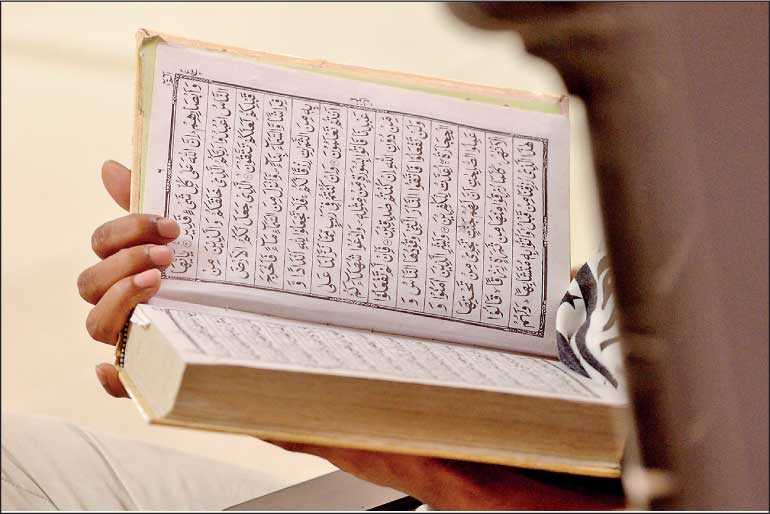Saturday Feb 14, 2026
Saturday Feb 14, 2026
Thursday, 3 September 2020 00:05 - - {{hitsCtrl.values.hits}}

By misquoting and misinterpreting the Holy Scriptures and with shallow knowledge about the contribution and role of Muslim women in Islamic history and civilisation, orthodoxy has reigned supreme over the affairs of Muslim women for centuries. Reforming MMDA to empower women will be and essential step in opening new horizons of opportunities for this half of the community – Pic by Shehan Gunasekara
Since the appointment of Ali Sabri as Minister of Justice by President GR, Muslim Marriage and Divorce Act (MMDA) has once again come into public focus. It is now common knowledge, how, after 10 years of labouring, when Justice Saleem Marsoof Committee (JSMC) delivered its report last year with a number of sensible and progressive reforms, they were sabotaged by a coalition of conservative forces, headed by the All Ceylon Jamiyyathul Ulama (ACJU) and supported by a bunch of power hungry and self-seeking Muslim politicians with a non-committal justice minister counting her days before the dissolution of parliament. 
Muslim community, especially the women, is now expecting the new minister to act on JSMC’s reforms. Already, the minister has expressed his abhorrence towards underage marriages, and in common with the rest of the country the age of marriage would, in all probability, be set at 18. This may be the first salvo to test the real meaning and implication of the controversial one-country-one-law mantra. Without conceding to the demand of ultra-nationalists to abolish Muslim personal laws altogether, the minister’s task is to modernise MMDA and inaugurate a new era in Muslim marital affairs.
However, restricting the age of marriage is the least of the controversies surrounding MMDA. In this, the minister will have his way and the conservatives may have no choice but to accept that change. But the most difficult part of JSMC reforms on which the minister requires all support and encouragement is in relation towards empowerment of Muslim women. The consent of the female partner before marrying and the appointment of women as Qazis are two reforms that empower Muslim women and they are sure to earn the wrath of the conservatives.
The minister should have the courage to stand against that opposition and should even take a step further and empower the woman judge at the Qazi court to have the final say in cases dealing with divorce, child custody and alimony.
In the name of sharia, misogyny rules in today’s Qazi courts. While MMDA stood still Muslim women marched forward and have reached new heights in modern Sri Lanka, thanks to C.W.W. Kannangara’s free education revolution and post-independent welfare state. Muslim women should also be thankful to Badiuddin Mahmud, who as the Minster of Education undertook certain extraordinary measures to improve female education in his community. As a result, a significant ratio of Muslim women today has emerged into a community of income earners, participating in various professions, as educationists, technologists, scientists, writers, authors and poets. They have become the chief bread winners in their families. It is therefore a crime to treat them as less equal than their male counterparts especially when it comes to matrimony.
By misquoting and misinterpreting the Holy Scriptures and with shallow knowledge about the contribution and role of Muslim women in Islamic history and civilisation, orthodoxy has reigned supreme over the affairs of Muslim women for centuries. Reforming MMDA to empower women will be and essential step in opening new horizons of opportunities for this half of the community. The minister therefore, has a historic role to play in this respect and he needs all the support from Muslim intelligentsia.
Empowering Muslim women through MMDA will, in addition, open the gate for them to play more leadership roles in community and national affairs in the future. Already, there is a complaint from their counterparts in other communities that women representation in the parliament does not reflect the strength of their votes. The situation is pathetic in the Muslim community. Except for Ferial Ashraf, who entered the parliament as a widow, and that too out of sympathy over the tragic demise of her husband, no other Muslim women ever became a parliamentarian in Sri Lanka. They don’t even enter the contest at provincial and local government levels. This has to change. By entering national politics Muslim women can break the community’s self-alienation at its very foundation.
For a long time, religious conservatism and male chauvinism, through subtle and sometimes open threats, had made women a silent and subjugated subset in the mainstream of public life. They are not even allowed to enter the mosque unless they are dead. This has deprived the community and the nation of their invaluable talent and skill in almost every field. MMDA in its current state reflects this subjugation. This is why it has to be reformed. How far will Minster Sabri go in redressing the current imbalances in MMDA will test not only his leadership qualities but also his government’s interpretation of the one-country-one-law maxim.
Gone are the days when community leaders could shout from the pulpit and public platforms that Islam has already raised the status of women right from its inception and then sit quiet about it. Past successes do not automatically ensure progress at present and success in future. Religious teaching has to remain dynamic and not static, and the Quran exudes that dynamism almost in every page. It is the mullah who has made it a close book. This is the fundamental problem that bedevils the status of women in Islam. JSMC report on MMDA was also the product of tireless efforts of women present in that committee. Minister Sabri must not let them down.
(The writer is attached to the School of Business and Governance, Murdoch University, Western Australia.)